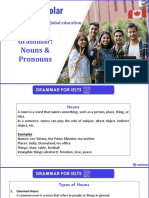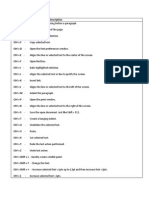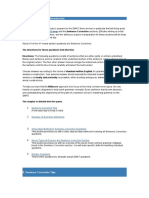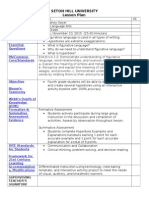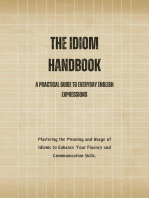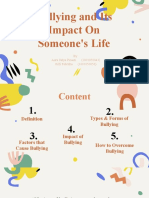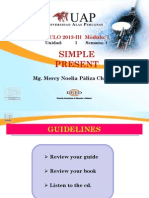0 ratings0% found this document useful (0 votes)
60 viewsMorphology VS Syntax
Morphology VS Syntax
Uploaded by
Aura SatyaMorphology is the study of word formation and structure, including processes like compounding, derivation, affixation, blending, clipping, and others. Syntax is the study of sentence structure and grammatical rules for arranging words into clauses and sentences. The main difference between morphology and syntax is that morphology looks at the internal structure of words, while syntax examines how words are combined to form phrases, clauses, and sentences. Some key terms in syntax include words, phrases, clauses, and sentences.
Copyright:
© All Rights Reserved
Available Formats
Download as DOC, PDF, TXT or read online from Scribd
Morphology VS Syntax
Morphology VS Syntax
Uploaded by
Aura Satya0 ratings0% found this document useful (0 votes)
60 views3 pagesMorphology is the study of word formation and structure, including processes like compounding, derivation, affixation, blending, clipping, and others. Syntax is the study of sentence structure and grammatical rules for arranging words into clauses and sentences. The main difference between morphology and syntax is that morphology looks at the internal structure of words, while syntax examines how words are combined to form phrases, clauses, and sentences. Some key terms in syntax include words, phrases, clauses, and sentences.
Copyright
© © All Rights Reserved
Available Formats
DOC, PDF, TXT or read online from Scribd
Share this document
Did you find this document useful?
Is this content inappropriate?
Morphology is the study of word formation and structure, including processes like compounding, derivation, affixation, blending, clipping, and others. Syntax is the study of sentence structure and grammatical rules for arranging words into clauses and sentences. The main difference between morphology and syntax is that morphology looks at the internal structure of words, while syntax examines how words are combined to form phrases, clauses, and sentences. Some key terms in syntax include words, phrases, clauses, and sentences.
Copyright:
© All Rights Reserved
Available Formats
Download as DOC, PDF, TXT or read online from Scribd
Download as doc, pdf, or txt
0 ratings0% found this document useful (0 votes)
60 views3 pagesMorphology VS Syntax
Morphology VS Syntax
Uploaded by
Aura SatyaMorphology is the study of word formation and structure, including processes like compounding, derivation, affixation, blending, clipping, and others. Syntax is the study of sentence structure and grammatical rules for arranging words into clauses and sentences. The main difference between morphology and syntax is that morphology looks at the internal structure of words, while syntax examines how words are combined to form phrases, clauses, and sentences. Some key terms in syntax include words, phrases, clauses, and sentences.
Copyright:
© All Rights Reserved
Available Formats
Download as DOC, PDF, TXT or read online from Scribd
Download as doc, pdf, or txt
You are on page 1of 3
At a glance
Powered by AI
The key takeaways are that morphology is the study of words and how they are formed, while syntax studies the structure of sentences. Some types of word formation discussed are compounding, derivation, affixation, blending, clipping, acronyms, etc.
Morphology deals with understanding how words are formed and the structure of words, while syntax focuses on the way sentences are developed and the structure of sentences.
Some types of word formation in English discussed are compounding, derivation (affixation), blending, clipping, acronyms, reanalysis, folk etymology, analogy, and novel creation.
Aur Satya Pinasti
1801050043
6B
Morphology Vs Syntax
1. What do you about morphology?
Morphology is the study of words, how they are formed, and their relationship to other
words in the same language.
2. What is the main discussion in morphology?
The main discussion in morphology is the structure of words and the effect of changes in
word form on the meaning and class of words.
3. Please explain the types of word formation in English!
a. Compounding
Compounding forms a word put of two or more root morphemes.
b. Rhyming compounds (subtype of compounds)
These words are compounded from two rhyming words.
c. Derivation
Derivation is the creation of words by modification of a root without the addition of
other roots. Often the effect is a change in part of speech.
d. Affixation (Subtype of Derivation)
The most common type of derivation is the addition of one or more affixes to a root,
as in the word derivation itself. This process is called affixation, a term which covers
both prefixation and suffixation.
e. Blending
Blending is especially creative in that speakers take two words and merge them
based not on morpheme structure but on sound structure.
f. Clipping
Clipping is a type of abbreviation of a word in which one part is 'clipped' off the rest,
and the remaining word now means essentially the same thing as what the whole
word means or meant.
g. Acronyms
Acronyms are formed by taking the initial letters of a phrase and making a word out
of it.
h. Reanalysis
Sometimes speakers unconsciously change the morphological boundaries of a word,
creating a new morph or making an old one unrecognizable.
i. Folk etymology
A popular idea of a word's origin that is not in accordance with its real origin.
j. Analogy
Sometimes speakers take an existing word as a model and form other words using
some of its morphemes as a fixed part, and changing one of them to something new,
with an analogically similar meaning.
k. Novel creation
In novel creation, a speaker or writer forms a word without starting from other
morphemes.
l. Creative respelling
Sometimes words are formed by simply changing the spelling of a word that the
speaker wants to relate to the new word.
4. What do you know about syntax?
Syntax is a branch of linguistics that studies the rules on words or clause in making
sentences. This clause is usually called subject, verb and object which are always in
order.
5. What are the differences between morphology and syntax?
Morphology deals with the understanding of how words are formed while syntax is
focused on the way sentences are developed. Basically morphology is the study of the
structure of words, while Syntax studies the structure of sentences. Together these
disciplines help linguists understand how language works.
6. Please explain the following terms as well as provide the
relevant example(s):
a. Word
Word is a letter or group of letters that has meaning when spoken and written.
Example of word: vegetable, tree, water, etc.
b. Phrase
Phrase is a group of words that work together to make meaning, but it is not a
complete sentence. It does not have both a subject and a verb.
Example of phrase : in the wind, the black hair, etc.
c. Clause
Clause is a group of words that contains both a subject and predicate or verb.
Example of clause : She cried, because her seashell was broken, etc.
d. Sentence
Sentence is the basic unit of language which expresses a complete thought.
Example of sentence : My brother is studying, I am sleeping, etc.
You might also like
- Lesson Plan in English 2 NounDocument5 pagesLesson Plan in English 2 NounJed N. Tabuñar100% (9)
- Part A - Developing An Outline For A Persuasive Essay - A Handout For E4Document11 pagesPart A - Developing An Outline For A Persuasive Essay - A Handout For E4Kelly Baidal SantosNo ratings yet
- Writing An Essay: Technology Is Changing Our Lives Information Technology Has Revolutionized The Way We WorkDocument2 pagesWriting An Essay: Technology Is Changing Our Lives Information Technology Has Revolutionized The Way We WorkBrayan TucciNo ratings yet
- Quarter Life CrisisDocument11 pagesQuarter Life CrisisAura Satya50% (2)
- The Participial PhraseDocument10 pagesThe Participial PhraseREYNNo ratings yet
- Progress Test 2 Units 6-10Document3 pagesProgress Test 2 Units 6-10Mikhail Sialiuk100% (2)
- Introducation To Syntax: Words, Phrases and ClausesDocument22 pagesIntroducation To Syntax: Words, Phrases and ClausesEdin MusićNo ratings yet
- Nouns and PronounsDocument18 pagesNouns and PronounsVarsha SNNo ratings yet
- Words in English - Types of Word FormationDocument7 pagesWords in English - Types of Word FormationVadim KiselevNo ratings yet
- Compare and Contrast Peer ReviewDocument2 pagesCompare and Contrast Peer Reviewapi-212361252100% (1)
- The Eight Parts of Speech: NounsDocument17 pagesThe Eight Parts of Speech: NounsValensia SumampouwNo ratings yet
- Brittanyjohnson-Choiceboard Long and Short VowelDocument16 pagesBrittanyjohnson-Choiceboard Long and Short Vowelapi-533709691No ratings yet
- Factors That Influence Good Word ChoiceDocument9 pagesFactors That Influence Good Word ChoiceFauzia Siddiqui50% (2)
- The Eight Parts of SpeechDocument6 pagesThe Eight Parts of SpeechJane JumawanNo ratings yet
- Paraphrasing PowerpointDocument9 pagesParaphrasing PowerpointMALOU ELEVERANo ratings yet
- Improving College Reading Skills: Ten StepsDocument40 pagesImproving College Reading Skills: Ten StepsMacarl Zordilla100% (1)
- Short KeysDocument4 pagesShort KeysAbhishek GoyalNo ratings yet
- Lesson 3 ProtectingyourmarriageDocument3 pagesLesson 3 Protectingyourmarriageapi-171799967No ratings yet
- Autism TherapyDocument1 pageAutism TherapyKUNNAMPALLIL GEJO JOHNNo ratings yet
- The 9 Parts of Speech - Definitions and ExamplesDocument1 pageThe 9 Parts of Speech - Definitions and Examplesstudent1919No ratings yet
- Identifying Main Ideas and Details 2021Document16 pagesIdentifying Main Ideas and Details 2021juanitak2711No ratings yet
- English DPT First Year Short Questions and Their AnswersDocument5 pagesEnglish DPT First Year Short Questions and Their AnswersNimra TariqNo ratings yet
- Asking Questions in English: Write Questions For The Underlined WordsDocument2 pagesAsking Questions in English: Write Questions For The Underlined WordsFatima VazquezNo ratings yet
- 1 Sentence Structure PDFDocument8 pages1 Sentence Structure PDFlivenessNo ratings yet
- Syntax: - Definition of Syntax - Noun Phrase and Verb Phrase - Phrase Structure Rules/ Tree DiagramsDocument20 pagesSyntax: - Definition of Syntax - Noun Phrase and Verb Phrase - Phrase Structure Rules/ Tree DiagramskassturiNo ratings yet
- A Conjunction Is A JoinerDocument9 pagesA Conjunction Is A JoinerSandy NodadoNo ratings yet
- WritingParagraphs UnityCoherence-1Document19 pagesWritingParagraphs UnityCoherence-1Mahmoud Harfoush100% (1)
- Participle PhrasesDocument12 pagesParticiple PhrasesMay LoNo ratings yet
- Main IdeaDocument42 pagesMain Ideawalastek07xNo ratings yet
- Effective WritingDocument26 pagesEffective WritingAnna Ayson-VegafriaNo ratings yet
- Introducing The Eight Parts of SpeechDocument2 pagesIntroducing The Eight Parts of SpeechSara TorelliNo ratings yet
- 34 Multiple MeaningWordsDocument3 pages34 Multiple MeaningWordsKriztaleen Pertz LptNo ratings yet
- Writing Process Lesson Plan Ted 509Document3 pagesWriting Process Lesson Plan Ted 509api-518692490No ratings yet
- By: Allien A. DionsonDocument10 pagesBy: Allien A. DionsonSìnnaj BorresNo ratings yet
- Parts of Speech DefinitionDocument43 pagesParts of Speech DefinitionmanjushaNo ratings yet
- And How To Tell The DifferenceDocument24 pagesAnd How To Tell The DifferenceLebronny JamesNo ratings yet
- Stress Students'Document37 pagesStress Students'janani a/p ayaooNo ratings yet
- Inferences Handout by Deb SmithDocument11 pagesInferences Handout by Deb SmithCris Alvin De GuzmanNo ratings yet
- Verb Tenses: Simple/progressive/perfect/perfect ProgressiveDocument4 pagesVerb Tenses: Simple/progressive/perfect/perfect Progressiveismail kaya100% (1)
- Quick Scale: Primary 6 (Writing)Document2 pagesQuick Scale: Primary 6 (Writing)Alex DuganNo ratings yet
- Verb PhraseDocument26 pagesVerb PhraseRey AdasaNo ratings yet
- Verbal Advantage Level 9Document14 pagesVerbal Advantage Level 9Jucilene DopheideNo ratings yet
- Phrase ClauseDocument17 pagesPhrase ClauseHawwin DodikNo ratings yet
- Module 2 PronounDocument3 pagesModule 2 PronounJohn Ian SalidoNo ratings yet
- Sentence Correction PrintDocument79 pagesSentence Correction Printashish koiralaNo ratings yet
- Phonetics ActivitiesDocument20 pagesPhonetics ActivitiesFreddyUcinfNo ratings yet
- David Williams: ContributorDocument4 pagesDavid Williams: ContributorCzarina Jasmine MadrigalNo ratings yet
- Cliches and Idioms PDFDocument2 pagesCliches and Idioms PDFskanzeniNo ratings yet
- Spelling: Word UseDocument3 pagesSpelling: Word UseMuda MuditaNo ratings yet
- Cause and Effect EssayDocument13 pagesCause and Effect EssayyesimmmNo ratings yet
- What Is A ClauseDocument16 pagesWhat Is A ClauseApril J. RiveraNo ratings yet
- Commas and SemicolonsDocument12 pagesCommas and Semicolonsapi-271252755100% (1)
- The Study of LanguageDocument26 pagesThe Study of LanguageGladyz Artjane Quilab Flores - CastilloNo ratings yet
- Building An Essay StairDocument52 pagesBuilding An Essay StairJuan Alejandro Rosales CoronelNo ratings yet
- Handling Hard WordsDocument12 pagesHandling Hard WordsAisyah MusfirahNo ratings yet
- Marriage PDFDocument22 pagesMarriage PDFMamta SinghNo ratings yet
- Student Teaching Ela LP HyperboleDocument4 pagesStudent Teaching Ela LP Hyperboleapi-264021425No ratings yet
- Written Report in Introduction To Linguistic: Saint Michael College, Hindang LeyteDocument7 pagesWritten Report in Introduction To Linguistic: Saint Michael College, Hindang LeyteKyndi MadrazoNo ratings yet
- English Personal PronounsDocument6 pagesEnglish Personal PronounsNedela DanielaNo ratings yet
- Homophones 1 Homophones 2Document1 pageHomophones 1 Homophones 2Lucia MeloNo ratings yet
- Lecture 3 Word FormationDocument8 pagesLecture 3 Word FormationAinur AimakhanovaNo ratings yet
- The Idiom Handbook: A Practical Guide to Everyday English ExpressionsFrom EverandThe Idiom Handbook: A Practical Guide to Everyday English ExpressionsNo ratings yet
- Makalah MorphologyDocument8 pagesMakalah MorphologyNur IslahNo ratings yet
- English Morphology: by Drs. I Wayan Suarnajaya, M.A., PH.DDocument33 pagesEnglish Morphology: by Drs. I Wayan Suarnajaya, M.A., PH.DDewa'd KrishnaDanaNo ratings yet
- Noun ClauseDocument37 pagesNoun ClauseAura SatyaNo ratings yet
- Kesalahan Siswa Dalam Menerjemahkan Materi Bacaan Bahasa Arab Ke Dalam Bahasa Indonesia Muzia Ranselengo, Mukhtar I MioloDocument10 pagesKesalahan Siswa Dalam Menerjemahkan Materi Bacaan Bahasa Arab Ke Dalam Bahasa Indonesia Muzia Ranselengo, Mukhtar I MioloAura SatyaNo ratings yet
- Syntactic Categories: Aura Satya Pinasti 1801050043 6BDocument2 pagesSyntactic Categories: Aura Satya Pinasti 1801050043 6BAura SatyaNo ratings yet
- What Makes A Good SpeechDocument3 pagesWhat Makes A Good SpeechAura SatyaNo ratings yet
- Text My HometownDocument3 pagesText My HometownAura SatyaNo ratings yet
- Global WarmingDocument15 pagesGlobal WarmingAura SatyaNo ratings yet
- Bullying and Its Impact On Someone's Life: By: Aura Satya Pinasti (1801050043) Silfi Febritha (1801050056)Document22 pagesBullying and Its Impact On Someone's Life: By: Aura Satya Pinasti (1801050043) Silfi Febritha (1801050056)Aura Satya100% (1)
- Recount Text MaterialDocument3 pagesRecount Text MaterialAura SatyaNo ratings yet
- The Use of Instagram As A Learning Media To Improve Students VocabularyDocument8 pagesThe Use of Instagram As A Learning Media To Improve Students VocabularyAura SatyaNo ratings yet
- Simple Present Tense Ingles I Unit 8 and 9Document78 pagesSimple Present Tense Ingles I Unit 8 and 9Josué GuillénNo ratings yet
- Passive VoiceDocument4 pagesPassive VoiceMarytere Valarezo CarrionNo ratings yet
- CAPTIONDocument3 pagesCAPTIONLia FitrianaNo ratings yet
- Subjuntivo para Expresar VoliciónDocument8 pagesSubjuntivo para Expresar VoliciónEdward AcunaNo ratings yet
- Disobedient Kid)Document7 pagesDisobedient Kid)ChristianNo ratings yet
- Primary 3 English 23.03.2020 PDFDocument2 pagesPrimary 3 English 23.03.2020 PDFRathnayaka Newil100% (1)
- Grammar TestDocument2 pagesGrammar TestChristine Jamie Sta AnaNo ratings yet
- AEF2e 4 GB 10ADocument4 pagesAEF2e 4 GB 10ACjavdioJeonNo ratings yet
- Atg Worksheet SubjectobjpronDocument2 pagesAtg Worksheet SubjectobjpronaaNo ratings yet
- SVA Level 2 Part 1Document28 pagesSVA Level 2 Part 1ezebelluciNo ratings yet
- Demo Lesson PlanDocument12 pagesDemo Lesson PlanAnonymous kQ8SfoVNo ratings yet
- University of Zakho Faculty of Humanities English Language DepartmentDocument10 pagesUniversity of Zakho Faculty of Humanities English Language DepartmentOMED gardiNo ratings yet
- Ucimo SrpskiDocument76 pagesUcimo SrpskiLea Gundelj100% (1)
- Word FormationDocument2 pagesWord FormationAbigail CorderoNo ratings yet
- Stress and IntonationDocument35 pagesStress and IntonationLy LacNo ratings yet
- Learning Competency Directory (LCD) : School Subject Teacher's Name Level References/Code QuarterDocument5 pagesLearning Competency Directory (LCD) : School Subject Teacher's Name Level References/Code QuarterTan JunNo ratings yet
- Baas Arts RESUMIDO (Autoguardado)Document18 pagesBaas Arts RESUMIDO (Autoguardado)Agustina RealNo ratings yet
- Using Since and For: 4-5 Since Since Is Followed by The Mention of ADocument2 pagesUsing Since and For: 4-5 Since Since Is Followed by The Mention of AFrikisitaNo ratings yet
- Updated LCP English Grade 5 FinalDocument17 pagesUpdated LCP English Grade 5 FinalRonuel Ducusin100% (1)
- Daftar Lengkap Regular Verb Beserta Artinya IrregularDocument30 pagesDaftar Lengkap Regular Verb Beserta Artinya Irregularrina100% (4)
- (GRAMMAR) Demonstrative Adjectives Vs Demonstrative PronounsDocument13 pages(GRAMMAR) Demonstrative Adjectives Vs Demonstrative PronounsAsma NasirNo ratings yet
- HKOJ - Conjunction Practice ExerciseDocument3 pagesHKOJ - Conjunction Practice ExerciseSylvia RodríguezNo ratings yet
- Underlining Simple Subject 1Document2 pagesUnderlining Simple Subject 1Joey Reyes100% (1)
- KEYSDocument16 pagesKEYSZemanic IzudinNo ratings yet
- ADJECTIVESDocument60 pagesADJECTIVESMana GargiNo ratings yet
- Run On SentenceDocument16 pagesRun On SentenceHoney Grace Calica RamirezNo ratings yet
- Telugu GrammerDocument17 pagesTelugu GrammerAnonymous LgcfwZrqwANo ratings yet







